Below I've included glfw-quick-test.c, which is basically copied verbatim from http://www.glfw.org/docs/latest/quick.html - except for removed use of glad, added background color, a couple of defines so it compiles on Ubuntu 14.04 (64-bit), and a preprocessor #ifdef switch (macro DO_OPENGL_THREE) to change requested OpenGL version.
When I compile with:
gcc -g -o glfw-quick-test.exe glfw-quick-test.c -lglfw -lGLU -lGL -lm
./glfw-quick-test.exe
... then I get the message "GLFW Requesting OpenGL 2.1" and drawing is fine:
When I compile with:
gcc -g -DDO_OPENGL_THREE -o glfw-quick-test.exe glfw-quick-test.c -lglfw -lGLU -lGL -lm
./glfw-quick-test.exe
... then I get the message "GLFW Requesting OpenGL 3.2" and the rotating triangle is not drawn at all - only the background color is preserved:
Can anyone explain why does this happen? Can I somehow get GLFW3 to draw even if OpenGL 3.2 is requested, and if so, how?
(I'm aware that the original source code says "// NOTE: OpenGL error checks have been omitted for brevity", but I'm not sure what sort of error checks I should add, to see what the problem would be with OpenGL 3.2 drawing ...)
The code, glfw-quick-test.c (EDIT: now with error checking):
// http://www.glfw.org/docs/latest/quick.html
#define UBUNTU14
#ifdef UBUNTU14 // assume Ubuntu 14.04
// strange; Ubuntu 14 GLFW/glfw3.h doesn't have GLFW_TRUE, GLFW_FALSE, mentions GL_TRUE GL_FALSE
#define GLFW_TRUE GL_TRUE
#define GLFW_FALSE GL_FALSE
#endif
//~ #include <glad/glad.h> // "GL/GLES/EGL/GLX/WGL Loader-Generator based on the official specs."
#include <GLFW/glfw3.h>
#include "linmath.h"
#include <stdlib.h>
#include <stdio.h>
static const struct
{
float x, y;
float r, g, b;
} vertices[3] =
{
{ -0.6f, -0.4f, 1.f, 0.f, 0.f },
{ 0.6f, -0.4f, 0.f, 1.f, 0.f },
{ 0.f, 0.6f, 0.f, 0.f, 1.f }
};
static const char* vertex_shader_text =
"uniform mat4 MVP;\n"
"attribute vec3 vCol;\n"
"attribute vec2 vPos;\n"
"varying vec3 color;\n"
"void main()\n"
"{\n"
" gl_Position = MVP * vec4(vPos, 0.0, 1.0);\n"
" color = vCol;\n"
"}\n";
static const char* fragment_shader_text =
"varying vec3 color;\n"
"void main()\n"
"{\n"
" gl_FragColor = vec4(color, 1.0);\n"
"}\n";
static void error_callback(int error, const char* description)
{
fprintf(stderr, "Error: %s\n", description);
}
static void key_callback(GLFWwindow* window, int key, int scancode, int action, int mods)
{
if (key == GLFW_KEY_ESCAPE && action == GLFW_PRESS)
glfwSetWindowShouldClose(window, GLFW_TRUE);
}
void checkGLerrors(char *label) {
// check OpenGL error
GLenum err;
while ((err = glGetError()) != GL_NO_ERROR) {
char* errorstr = "";
switch(err) {
case GL_INVALID_OPERATION: errorstr="INVALID_OPERATION"; break;
case GL_INVALID_ENUM: errorstr="INVALID_ENUM"; break;
case GL_INVALID_VALUE: errorstr="INVALID_VALUE"; break;
case GL_OUT_OF_MEMORY: errorstr="OUT_OF_MEMORY"; break;
case GL_INVALID_FRAMEBUFFER_OPERATION: errorstr="INVALID_FRAMEBUFFER_OPERATION"; break;
}
printf("OpenGL error ('%s'): %d %s\n", label, err, errorstr);
}
}
int main(void)
{
GLFWwindow* window;
GLuint vertex_buffer, vertex_shader, fragment_shader, program;
GLint mvp_location, vpos_location, vcol_location;
glfwSetErrorCallback(error_callback);
if (!glfwInit())
exit(EXIT_FAILURE);
// NB: Ubuntu will not draw if 3.2 (just black screen) - only if 2.0 or 2.1?
#ifdef DO_OPENGL_THREE
printf("GLFW Requesting OpenGL 3.2\n");
glfwWindowHint(GLFW_CONTEXT_VERSION_MAJOR, 3);
glfwWindowHint(GLFW_CONTEXT_VERSION_MINOR, 2);
glfwWindowHint(GLFW_OPENGL_PROFILE, GLFW_OPENGL_CORE_PROFILE); // only 3.2+
glfwWindowHint(GLFW_OPENGL_FORWARD_COMPAT, GLFW_TRUE); //only 3.0+
glfwWindowHint(GLFW_RESIZABLE, GL_TRUE); // https://stackoverflow.com/q/23834680/
#else
printf("GLFW Requesting OpenGL 2.1\n");
glfwWindowHint(GLFW_CONTEXT_VERSION_MAJOR, 2); // 2);
glfwWindowHint(GLFW_CONTEXT_VERSION_MINOR, 1); // 0);
#endif
checkGLerrors("post hint");
window = glfwCreateWindow(640, 480, "Simple example", NULL, NULL);
if (!window)
{
glfwTerminate();
exit(EXIT_FAILURE);
}
checkGLerrors("post glfwCreateWindow");
glfwSetKeyCallback(window, key_callback);
glfwMakeContextCurrent(window);
//~ gladLoadGLLoader((GLADloadproc) glfwGetProcAddress);
glfwSwapInterval(1);
// NOTE: OpenGL error checks have been omitted for brevity
glGenBuffers(1, &vertex_buffer);
checkGLerrors("post glGenBuffers");
glBindBuffer(GL_ARRAY_BUFFER, vertex_buffer);
glBufferData(GL_ARRAY_BUFFER, sizeof(vertices), vertices, GL_STATIC_DRAW);
vertex_shader = glCreateShader(GL_VERTEX_SHADER);
glShaderSource(vertex_shader, 1, &vertex_shader_text, NULL);
glCompileShader(vertex_shader);
fragment_shader = glCreateShader(GL_FRAGMENT_SHADER);
glShaderSource(fragment_shader, 1, &fragment_shader_text, NULL);
glCompileShader(fragment_shader);
program = glCreateProgram();
glAttachShader(program, vertex_shader);
glAttachShader(program, fragment_shader);
glLinkProgram(program);
checkGLerrors("post glLinkProgram");
mvp_location = glGetUniformLocation(program, "MVP");
vpos_location = glGetAttribLocation(program, "vPos");
vcol_location = glGetAttribLocation(program, "vCol");
checkGLerrors("post gl locations");
glEnableVertexAttribArray(vpos_location);
checkGLerrors("post gl EnableVertexAttribArray");
glVertexAttribPointer(vpos_location, 2, GL_FLOAT, GL_FALSE,
sizeof(float) * 5, (void*) 0);
checkGLerrors("post glVertexAttribPointer");
glEnableVertexAttribArray(vcol_location);
checkGLerrors("post glEnableVertexAttribArray");
glVertexAttribPointer(vcol_location, 3, GL_FLOAT, GL_FALSE,
sizeof(float) * 5, (void*) (sizeof(float) * 2));
checkGLerrors("post glVertexAttribPointer");
while (!glfwWindowShouldClose(window))
{
float ratio;
int width, height;
mat4x4 m, p, mvp;
glfwGetFramebufferSize(window, &width, &height);
ratio = width / (float) height;
glViewport(0, 0, width, height);
glClearColor(0.784314, 0.780392, 0.305882, 1.0); // add background color
glClear(GL_COLOR_BUFFER_BIT);
mat4x4_identity(m);
mat4x4_rotate_Z(m, m, (float) glfwGetTime());
mat4x4_ortho(p, -ratio, ratio, -1.f, 1.f, 1.f, -1.f);
mat4x4_mul(mvp, p, m);
glUseProgram(program);
glUniformMatrix4fv(mvp_location, 1, GL_FALSE, (const GLfloat*) mvp);
glDrawArrays(GL_TRIANGLES, 0, 3);
glfwSwapBuffers(window);
glfwPollEvents();
}
glfwDestroyWindow(window);
glfwTerminate();
exit(EXIT_SUCCESS);
}

